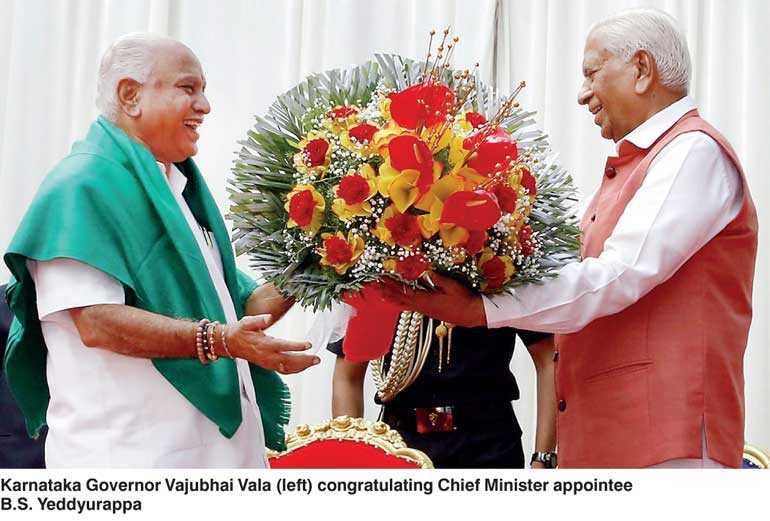Thursday Feb 26, 2026
Thursday Feb 26, 2026
Saturday, 19 May 2018 00:57 - - {{hitsCtrl.values.hits}}

The gross misuse of the State or Provincial Governor in India by the ruling party at the Centre in New Delhi to achieve its narrow political interests continues to plague the functioning of the Indian Constitution.
While pretences about respecting legal and Constitutional provisions are kept, the “spirit of the law” is sacrificed at the altar of political expediency, often unabashedly, sabotaging the very purpose of the Constitution.
Article 356 of the Indian Constitution gives the Central Government power to impose President’s/Governor’s rule in a State in case there is a perceived Constitutional breakdown there. But this provision has been grossly misused since 1954 to dislodge recalcitrant or inconvenient State Governments run by Opposition parties.
Between 1966 and 1977, Prime Minister Indira Gandhi imposed President’s Rule 39 times in different states. Similarly, the Janata Party, which came to power in 1977 after the 1975-1977 State of Emergency, imposed President’s Rule in 9 states which were ruled by Congress!
This obnoxious practice was curbed by the Supreme Court only in 1994, through the S.R. Bommai vs. Union of India case. S.R. Bommai, whose Government in Karnataka was sacked, successfully challenged it in Court. The Court thereupon laid down some conditions for dismissal or the imposition of President’s or Governor’s Rule.
However, the Centre has continued to misuse the office of Governor, making the appointee its de facto agent. The first thing that a party does when it comes to power at the Centre is to change the governors of the States and Union Territories.
Prime Minister Narendra Modi, who came to power in May 2014, changed the governor in 26 of the 29 States. He changed all the seven Lt. Governors in charge of smaller units called Union Territories, which are more or less under the control of the Centre. Many of the governors tend to be politicians or persons associated with the party in power at the Centre.
The framers of the Constitution had intended the Governor to be an independent, neutral umpire, a non-interfering advisor besides being the eyes and ears of the Centre. But except for the last requirement, the others are observed in the breach.
Case of Karnataka
The Centre’s misuse of the Governor’s office is stark in the ongoing post-election imbroglio in Karnataka State in South India.
In the recent elections to the Karnataka State Assembly, the Bharatiya Janata Party (BJP) led by Narendra Modi at the national level and B.S. Yeddyurappa at the State level, got 104 of the 222 seats up for grabs. The ruling Congress led locally by Rahul Gandhi at the Centre and Siddharamaiah in Karnataka, got 78 seats; the Janata Dal (Secular) headed by H.D. Kumaraswamy got 37; and others got three.
But none of the parties had the 112 required for an absolute majority in the House of 222 which will be need to bid for power. The competing parties therefore had to look for supporters outside their ranks.
The Congress and the JD (S) were quick act. They formed an alliance with two others and met the Governor to tell him that they together have 117 MLAs and therefore they must be invited to form the Government. They cited the Constitution to argue that the Governor should ask that group to form a government, which, in his view, appears to have majority support in the House. And they have majority support.
They said that inviting the single largest party is only one of the principals that the Governor may follow. And they added that in this case, he cannot follow that principle because the BJP will have to poach on other parties to get the numbers in violation of the Anti-Defection Act of 1985.
‘Horse trading’ involving big money and other blandishments which had been the bane of Indian Parliamentary politics prior to 1985, would be revived, they pointed out.
 Precedents
Precedents
Congress and JD (S) recalled that in the Goa elections of March 2017, the Congress had emerged as the single largest party with 17 seats in the 60-seat Assembly, and the BJP had come second with 12. But the BJP quickly struck a post-poll alliance with the MGP and GFP to get the required numbers and the Governor unhesitatingly asked the combine to form the government.
A similar situation emerged in Manipur after the March 2017 elections. The Congress was the single largest party with 28 seats and the BJP had come second with 21. But the BJP quickly sewed up a poll alliance with other defeated parties. The Governor again unhesitatingly asked the BJP-led combine to form the government.
After the March 2018 elections in Meghalaya, the BJP prevented the single largest party, the Congress, from coming to power by getting the NPEP, UDP, PDF, and HSDPDP to combine and make a bid. The BJP, with just two MLAs, joined the bid. And when the Governor called upon the combine and not the Congress to form the government, the BJP became part of it. The single largest party, the Congress, was out in the cold.
Based on the same principle, why can’t the Governor of Karnataka follow suit and ask the Congress-JD (S) to form the government, the Congress asked.
Meanwhile, the BJP went about fishing for MLAs from the Congress. According to JD (S) leader, Kumaraswamy, the BJP has been offering INR 100 crore (INR 1,000 million or $ 14.7 million) per MLA.
Simultaneously, the BJP went to the Governor and told him that, as per convention, it should be given the first chance to form a government being the single largest party in the House. Governor Vajubhai Vala, who is a card holding BJP man from Modi’s home State of Gujarat, disregarded the Congress-JD (S) combination’s claim and opted to give the BJP (with just 104 MLAs) the first chance to form the government. And he also gave the BJP 15 days to prove its majority.
Supreme Court approached
The Congress and JD (S) cried foul and said that ensconced in power, the BJP will use State and money power, and the ample time given, to buy up their MLAs. They asked the Supreme Court to nullify Governor Vajubhai Vala’s order and stay the imminent swearing in of BJP leader B.S. Yeddyurappa as Chief Minister.
The Supreme Court which is now under the thumb of the Centre (due to the alleged misdeeds of Chief Justice Dipak Misra) refused to stay the swearing-in of the BJP leader Yeddyurappa as Chief Minister, but agreed to continue to hear the Congress-JD(S) case. Meanwhile, to prevent access to poachers, the Congress and JD (S) herded their flock into a resort outside Bengaluru.
Anti-Defection Law
India has an Anti-Defection Law since 1985 which prevents crossing over of elected members of Legislatures by the threat of disqualification. As per the law, now, no elected member of a Legislature can switch sides unless two-thirds of the members of his party in the Legislature also switch with him.
However, individual legislators have switched, and then gone to Court in appeal. Disqualification under the Anti-Defection Act is justiciable.
Further, since the Anti-Defection Act comes into operation only after an MLA has been sworn-in, all defections will have to be engineered before the swearing-in ceremony. Therefore, the Karnataka Governor cum BJP member Vajubhai Vala is unlikely to swear-in the members of the Assembly before the BJP buys up the required number of MLAs. This is why he has so generously given the BJP 15 days to do the job.